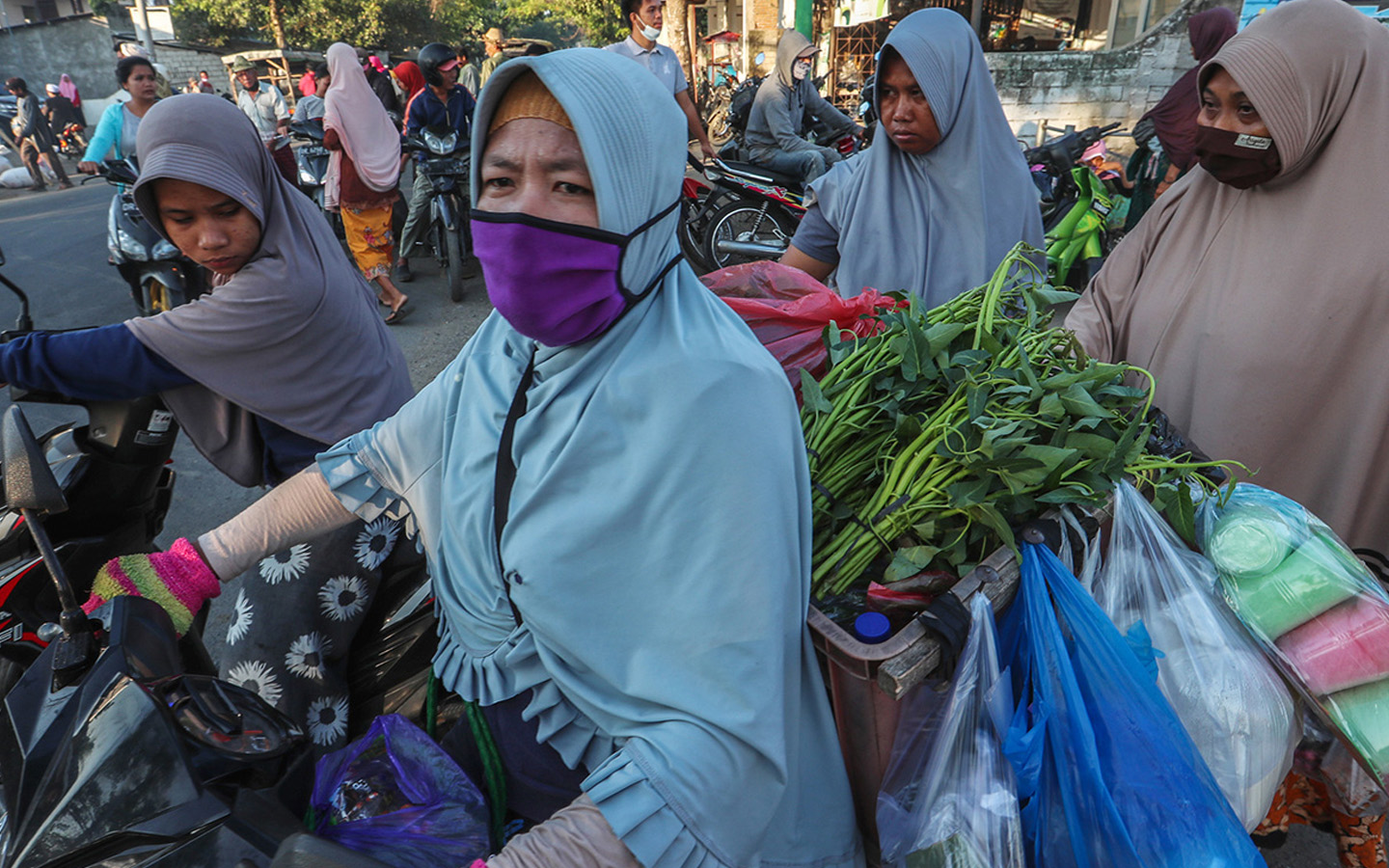Expanding Financial Inclusion through Digital Innovations
Financial inclusion is increasingly considered important in promoting economic growth and equity. Rapid technological changes and digitalization offer opportunities to expand financial inclusion. ADB and partner KfW are helping Indonesia expand financial inclusion through digital innovations that ensure that small businesses, women, youth, and those living in rural areas are more fully included in the formal banking system.
The Unmet Need for Financial Inclusion
Many factors contribute to a lack of financial inclusion in Indonesia. The country’s archipelagic nature and its sociocultural diversity constrain financial institutions. Innovations have been introduced in the financial technology (fintech) industry, but many consumers hardly understand them, much less access them. In 2019, financial inclusion in the country was 49% and financial literacy was 38%.
Against this backdrop, rapid technological changes that challenge the country’s finance sector are happening. More and more Indonesian businesses are going digital. Many businesses, particularly micro, small, and medium-sized enterprises (MSMEs), have difficulty accessing e-commerce and online platforms. The country’s data infrastructure, which serves as the foundation for digital financial inclusion, must keep pace. It cannot fully support integrating the unbanked and underbanked into the formal financial system.
“Accounting for 98% of the total workforce and over half of the GDP, MSMEs are the backbone of Indonesia’s economy, yet many cannot fully access financing and other financial services,” said ADB financial sector specialist Poornima Jayawardana. “Financial inclusion will unlock funding to help Indonesian small businesses grow, boosting jobs and the economy.
Financial inclusion will unlock funding to help Indonesian small businesses grow, boosting jobs and the economy.
Poornima Jayawardanafinancial sector specialist, ADB
Reaching the Unbanked
Several population segments are particularly vulnerable to financial exclusion. These are women, the youth, and those living in rural areas nationwide. Indonesia laid out a comprehensive approach in its National Strategy for Financial Inclusion to address this. It aims to improve financial education in the country, address public property rights, and enhance intermediation and distribution channels, government financial services, and consumer protection. This strategy tripled the number of e-money and branchless banking agents while introducing novel programs such as cashless social assistance.
To accelerate its progress, ADB and KfW are helping the government reach more consumers through the Promoting Innovative Financial Inclusion Program. The first phase of this program was completed in 2020, and the second phase in 2022. Some of the program’s first key actions include supporting the National Council for Financial Inclusion in issuing the new National Strategy for Financial Inclusion and the Financial Services Authority (OJK) in developing a 5-year Digital Finance Innovation Roadmap and Action Plan It also supported the Bank Indonesia launch its Payment System Blueprint 2025.
The program also supported launching the world’s first stand-alone financial inclusion strategy for women to address gender gaps in financial inclusion. This strategy laid out the country’s targets for women’s financial inclusion, introduced the first national definition of women-owned or led businesses, and established a national women’s financial inclusion network.
The program also focused on the youth, a key demographic for financial inclusion. About 26% of the country’s population are millennials. To reach the sector, OJK, with the program’s support and in collaboration with the ADB Youth for Asia, launched the world’s first Youth Financial Inclusion Strategy. To support this strategy, the “Youth Finsights Survey” was conducted to understand better the Indonesian youth’s financial inclusion status, behavior, and goals and enable them to contribute to financial inclusion initiatives. A program for national youth ambassadors who will function as influencers in universities and social media was also rolled out to enhance financial awareness among the youth.
The program helped OJK develop and adopt the Team for Acceleration of Regional Financial Access (TPAKD) Roadmap to address regional disparities in financial inclusion. This outlined policy and regulations at the sub-national level in the next 5 years, with programs such as digital finance, sharia finance, non-bank financial services, and capital markets. It also supported the OJK in launching the Eastern Indonesia Financial Innovation Lab (EIFIL) to enable the regional development banks (BPDs) to collaborate with the fintech sector to become financial inclusion champions. EIFIL collaborators map customer needs, design and develop new financial products, and digitize operations while building staff competencies. These help BPDs fast-forward digital transformation and credit expansion.
An Inclusive Future
The program has already produced numerous benefits for the country.
Subprogram 1 helped institutionalize several vital policies that laid the groundwork for a more inclusive banking system in the country. The National Strategy for Financial Inclusion 2020-2024 provided the legal basis to set financial inclusion targets to expand financial services. The Digital Finance Innovation Roadmap and Action Plan 2020-2024 encouraged wider use of technology. Indonesia’s Payment System Blueprint 2025 set out guidelines to integrate the national digital economy and finance to reduce poverty in marginalized communities while ensuring open access to data. These policies unified the country’s approach to reaching the unbanked and underbanked, particularly the MSMEs, women, youth, and those living in rural areas.
The program contributed to digital innovations that expanded financial inclusion in Indonesia. It helped launch the Financial Access Point Map, a geospatial technology that identifies the needs of financially underserved people, improves the design, implementation, and monitoring of financial inclusion strategies and action plans, and enables better targeting of future initiatives based on people’s needs. It supported the launch of “LOKASIKU,” a geospatial financial service mobile application that helps the unbanked and underbanked locate branchless banking agents and other financial service providers in real time. In addition, the program helped pilot a national biometric ID to make opening a bank account easier and cheaper for clients.
While subprogram 1 concentrated on the country’s foundational reforms and technology for financial inclusion, subprogram 2 focused on implementing and operationalizing them. Both subprograms strongly supported financial literacy and consumer protection to promote responsible financial inclusion.
Subprogram 2 helped more MSMEs, women, and youth use digital financial services by reaching out to rural areas. It implemented the Financial Inclusion Action Plan for 2020–2024, which integrated gender targets. It established and fully operationalized the Task Force for the Acceleration and Expansion of Regional Digitalization for local government services. To foster innovation, promote digital financial consumer protection and literacy, and address emerging fintech issues, subprogram 2 continued to support the OJK regulatory sandbox. To help individuals and MSMEs withstand and quickly recover from climate-related impacts, the program integrated a climate adaptation and resilience component along the business value chain.
Through these changes, Indonesia is increasing access to the formal banking system for MSMEs, women, youth, and those living in rural areas. When the final phase ends in 2024, projections show that 65% of the overall population including women and youth will have more access to the formal banking system. MSMEs’ access to formal credit will also increase to 30% from 19% of all disbursed bank loans.
Cost
$727.1 million
- ADB Resources $500 million
Cofinancing Partner
- KfW Bankengruppe (Loan) $227.1 million
Dates
Approval Date 9 December 2020
Signing Date 22 December 2020
Completion Date 31 October 2021


